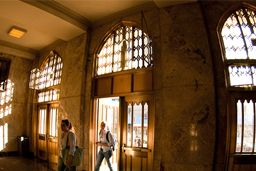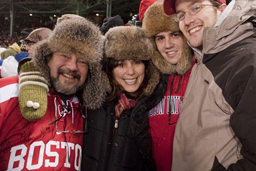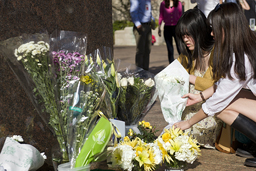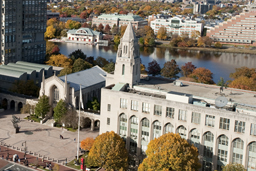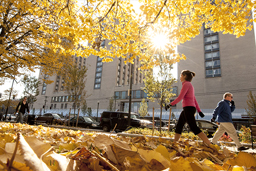
Les Kaufman and a team of researchers gathered in Cambodia to examine and model the food webs at Tonle Sap Lake, the country’s primary source for fish, rice, and protein.
Whether it’s halfway around the world or just across town, CAS faculty, researchers, and students travel wherever there is an opportunity to further their teaching, advance their education, or make critical discoveries that help us understand the world we live in and make a positive difference for life around the globe. This commitment to make the world a better—and better-understood—place contributes to BU’s growing reputation as a leading, global university.
The work of Professor of Biology Les Kaufman epitomizes how CAS researchers have an impact on a global scale. Professor Kaufman journeyed to Asia to help the people of Cambodia’s Tonlé Sap region find new ways to balance their emerging economy and alleviate widespread poverty while protecting the fish, water, and biodiversity of the area’s delicate ecosystem. To do this, Kaufman used an interdisciplinary approach that included massive computer models of natural systems. Kaufman’s work is supported in part by a three-year, $500,000 grant from the MacArthur Foundation. (Read more about Kaufman’s work in Asia.)
Professor of Earth & Environment Ranga Myneni and colleagues are also making a difference, adding to our understanding of global climate change. They used the latest satellite and remote sensing technology to produce a study showing in detail how rising levels of carbon dioxide are changing temperature and vegetation in far northern latitudes much more rapidly than previously estimated (read more).
Professor of European Integration Jean Monnet and Professor of International Relations & Political Science Vivien Schmidt led our integration into the Global Erasmus Mundi (GEM) program. Built on the earlier European Erasmus program (itself derived from the medieval practice of students travelling from university to university to acquire knowledge), GEM fosters student exchanges among universities around the world at both the undergraduate and graduate levels. GEM, therefore, provides BU students and faculty with a worldwide network for collaboration and learning (read more). Schmidt, an internationally-recognized scholar on political economy, was also invited to give testimony at the European Parliament on issues related to the Eurozone crisis and how to reform the European Union. Schmidt, the founding director of the Center for the Study of Europe, attracted a European Union Commission grant that supports a public lecture series by European artists, writers, diplomats, and public intellectuals. Through these efforts, Schmidt brings BU closer to the world—and the world closer to our students and faculty (read more).
New this year is the Zanzibar program (read more). The program is directed by Timothy Longman, associate professor of political science and director of the Center for African Studies, and explores issues of religion, politics, and identity.
A grant from the US Embassy in Iraq made possible another innovative overseas initiative, the Mosul University Archaeology Program (MAP). Through MAP, a team of archaeologists under the direction of BU Assistant Professor of Archaeology Michael Danti have partnered with educators at Mosul University to revive higher education and cultural heritage management in Iraq. MAP centers on the study of Iraqi archaeology and culture and includes curriculum development, design and implementation of online courses, real-time videoconferences, and cultural study programs in the US and in Iraq (read more).
CAS researchers and students made important contributions closer to home, too, finding new ways to make life better and more ecologically sustainable in Boston and across New England. CAS played a major role in BU’s Sustainable Neighborhoods Lab (SNL), a partnership of BU, IBM, and the City of Boston with the goal of making urban environments more sustainable. Under the leadership of Professor of Earth & Environment Nathan Phillips, acting SNL director, the lab has promoted community engagement, conducted research and data analysis, and pursued grant funding (read more). Phillips received considerable media attention for his research on Boston’s infrastructure of natural gas pipelines, finding more than 3,300 leaks and prompting repairs at potentially explosive sites (read more). Assistant Professor of Earth & Environment Lucy Hutyra played a leading role in this year’s Smarter Cities conference, part of the SNL initiative. Hutyra, with colleagues from the College of Engineering and other experts, explored ideas to help make cities more environmentally sustainable (read more).

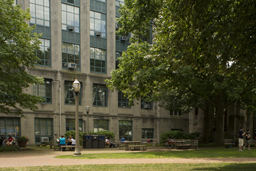
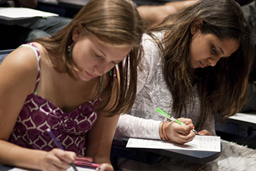
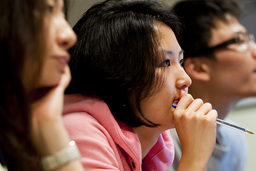
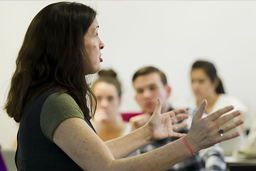
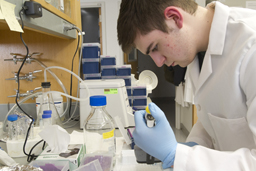
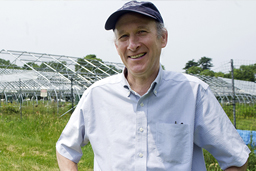 Strengthening Connections to the Community and the World
Strengthening Connections to the Community and the World